
The state of South Carolina is served by the following area codes:
- 803 / 839, which serves central South Carolina, including Columbia
- 843 / 854, which serves eastern and coastal South Carolina
- 864, which serves northwest South Carolina

The state of South Carolina is served by the following area codes:

North Carolina is a state in the Southern United States. The state is the 28th largest and 9th-most populous of the United States. It is bordered by Virginia to the north, the Atlantic Ocean to the east, Georgia and South Carolina to the south, and Tennessee to the west. In the 2020 census, the state had a population of 10,439,388. Raleigh is the state's capital and Charlotte is its largest city. The Charlotte metropolitan area, with a population of 2,595,027 in 2020, is the most-populous metropolitan area in North Carolina, the 21st-most populous in the United States, and the largest banking center in the nation after New York City. The Raleigh-Durham-Cary combined statistical area is the second-largest metropolitan area in the state and 32nd-most populous in the United States, with a population of 2,043,867 in 2020, and is home to the largest research park in the United States, Research Triangle Park.
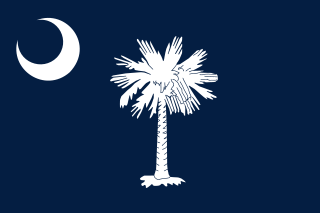
South Carolina is a state in the coastal Southeastern region of the United States. It is bordered to the north by North Carolina, to the southeast by the Atlantic Ocean, and to the southwest by Georgia across the Savannah River. South Carolina is the 40th most extensive and 23rd most populous U.S. state with a recorded population of 5,124,712 according to the 2020 census. In 2019, its GDP was $213.45 billion. South Carolina is composed of 46 counties. The capital is Columbia with a population of 137,300 in 2020; while its largest city is Charleston with a 2020 population of 150,277. The Greenville–Spartanburg-Anderson metropolitan area is the most populous in the state, with a 2020 population estimate of 1,455,892.
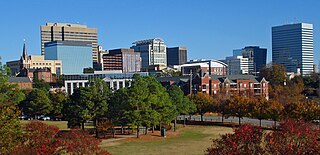
Columbia is the capital city of the U.S. state of South Carolina. With a population of 136,632 at the 2020 census, it is the second-largest city in South Carolina. The city serves as the county seat of Richland County, and a portion of the city extends into neighboring Lexington County. It is the center of the Columbia Metropolitan Statistical Area, which had a population of 829,470 in 2020 and is 7th largest urban center in the Deep South and the 72nd-largest metropolitan statistical area in the nation. The name Columbia is a poetic term used for the United States, derived from the name of Christopher Columbus, who explored for the Spanish Crown. Columbia is often abbreviated as Cola, leading to its nickname as "Soda City."

Charleston is the largest city in the U.S. state of South Carolina, the county seat of Charleston County, and the principal city in the Charleston metropolitan area. The city lies just south of the geographical midpoint of South Carolina's coastline on Charleston Harbor, an inlet of the Atlantic Ocean formed by the confluence of the Ashley, Cooper, and Wando rivers. Charleston had a population of 150,277 at the 2020 census. The 2020 population of the Charleston metropolitan area, comprising Berkeley, Charleston, and Dorchester counties, was 799,636 residents, the third-largest in the state, 8th-largest in the Deep South and the 74th-largest metropolitan statistical area in the United States.
Scouting in South Carolina has a long history, from the 1910s to the present day, serving thousands of youth in programs that suit the environment in which they live.

Florence is a city in and the county seat of Florence County, South Carolina, United States. It lies at the intersection of Interstates 20 and 95 and is the eastern terminus of the former. It is the primary city within the Florence metropolitan area. The area forms the core of the historical Pee Dee region of South Carolina, which includes the eight counties of northeastern South Carolina, along with sections of southeastern North Carolina. As of the 2020 census, the population of Florence was 39,899.

Conway is a city in Horry County, South Carolina, United States. The population was 24,849 at the 2020 census, up from 17,103 in 2010 census. It is the county seat of Horry County and is part of the Myrtle Beach metropolitan area. It is the home of Coastal Carolina University.

The governor of South Carolina is the head of government of South Carolina. The governor is the ex officio commander-in-chief of the National Guard when not called into federal service. The governor's responsibilities include making yearly "State of the State" addresses to the South Carolina General Assembly, submitting an executive budget, and ensuring that state laws are enforced.

Charles Cotesworth Pinckney was a Founding Father of the United States, military officer during the Revolutionary War, attorney, planter, and slave owner. A delegate to the Constitutional Convention, Pinckney was a signer of the U.S. Constitution and later served as U.S. Minister to France. He was twice nominated as the presidential candidate of the Federalist Party, in 1804 and 1808, but lost both elections, the first to Thomas Jefferson and the second to James Madison.

James Lawrence Orr was an American diplomat and politician who served as the 22nd speaker of the United States House of Representatives from 1857 to 1859. He also served as the 73rd governor of South Carolina from 1865 to 1868 after a term in the Confederate States Senate.

The South Carolina General Assembly, also called the South Carolina Legislature, is the state legislature of the U.S. state of South Carolina. The legislature is bicameral and consists of the lower South Carolina House of Representatives and the upper South Carolina Senate. All together, the General Assembly consists of 170 members. The legislature convenes at the State House in Columbia.

The United States District Court for the District of South Carolina is the federal district court whose jurisdiction is the state of South Carolina. Court is held in the cities of Aiken, Anderson, Beaufort, Charleston, Columbia, Florence, Greenville, and Spartanburg.
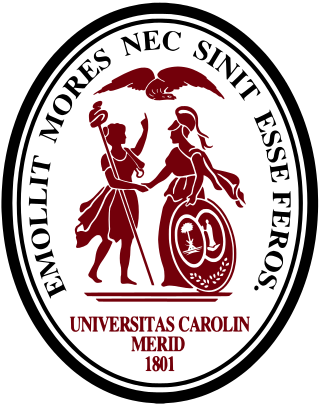
The University of South Carolina is a public research university in Columbia, South Carolina. It is the flagship of the University of South Carolina System and the largest university in the state by enrollment. Its main campus is on over 359 acres (145 ha) in downtown Columbia, close to the South Carolina State House. The university is classified among "R1: Doctoral Universities with Highest Research Activity". It houses the largest collection of Robert Burns and Scottish literature materials outside Scotland and the world's largest Ernest Hemingway collection.

The Upstate is the region in the westernmost part of South Carolina, United States, also known as the Upcountry, which is the historical term. Although loosely defined among locals, the general definition includes the 10 counties of the commerce-rich I-85 corridor in the northwest corner of South Carolina. This definition coincided with the Greenville–Spartanburg–Anderson, SC combined statistical area, as first defined by the Office of Management and Budget (OMB) in 2015. In 2018, the OMB redefined the CSA such that it no longer included Abbeville County. That definition remains as of 2020.

Robert Young Hayne was an American lawyer, planter and politician. He served in the United States Senate from 1823 to 1832, as Governor of South Carolina 1832–1834, and as Mayor of Charleston 1836–1837. As Senator and Governor, he was a leading figure in the Nullification Crisis and, along with John C. Calhoun and James Hamilton Jr., a vocal proponent of the doctrines of states' rights, compact theory, and nullification; his 1830 debate in the Senate with Daniel Webster is considered a defining episode in the constitutional crisis which precipitated the American Civil War.
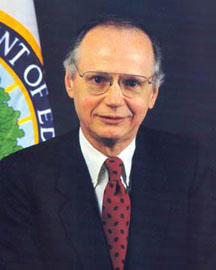
Richard Wilson Riley is an American politician, the United States Secretary of Education under President Bill Clinton and the 111th governor of South Carolina. He is a member of the Democratic Party. Riley is the only Democrat to serve two consecutive terms as governor in the time since the state constitution was amended to allow governors to serve consecutive terms.

The lieutenant governor of South Carolina is the second-in-command to the governor of South Carolina. Beyond overseeing the Office on Aging and the responsibility to act or serve as governor in the event of the office's vacancy, the duties of the lieutenant governor are chiefly ceremonial. The current lieutenant governor is Pamela Evette, who took office January 9, 2019.

South Carolina government and politics covers the three different branches of government, as well as the state constitution, law enforcement agencies, federal representation, state finances, and state taxes. South Carolina is a state in the United States of America and was the eighth admitted to the Union. The state of South Carolina was preceded by the Crown Colony of South Carolina, a constitutional monarchy which was overthrown during the American Revolution. Presently, South Carolina's government is formed as a representative democracy.
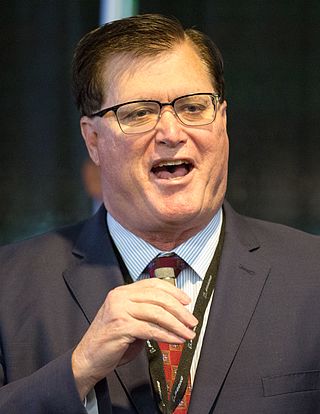
The 2018 South Carolina House of Representatives elections took place as part of the biennial United States elections. South Carolina voters elected state representatives in all 124 of the state house's districts. State representatives serve two-year terms in the South Carolina State House. A statewide map of South Carolina's state House districts can be obtained from the South Carolina House's website here, and individual district maps can be obtained from the U.S. Census here.